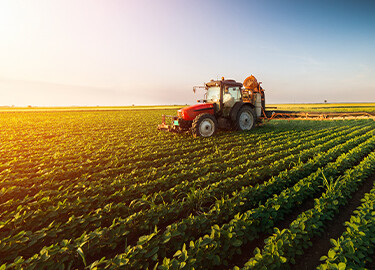In the decades ahead, the global population is expected to increase significantly. According to the United Nations (UN), by 2050, there could be almost 10 billion people on the planet compared to around eight billion people today.
It’s hard to know exactly how this population growth will impact the global economy. However, one thing we can be sure of is that it will dramatically increase demand for food, fibre, and other agricultural products.
Given this outlook, eToro has developed the AgriWorldWide Smart Portfolio. Designed to provide investors with broad exposure to the agricultural world, this portfolio offers access to both agricultural commodities such as wheat, corn, and sugar, as well as agriculture technology (AgTech) companies that are revolutionising processes across the industry.
INVEST IN AGRIWORLDWIDE
Copy Trading does not amount to investment advice
76% of retail CFD accounts lose money
The backbone of the global economy
Agriculture has long been the backbone of the global economy. One of the oldest industries, it provides us with the food we need to survive and stay healthy. It also plays a key role in economic growth. Without access to nutritious food, human development would stall and economic growth would deteriorate.
In the years and decades ahead, however, the agriculture industry is set to play an even bigger role within the economy. With the global population forecast to increase by nearly two billion people by 2050, demand for food is set to rise by around 60% compared to 2020 levels1. So, maximising industry output will be crucial.
AgTech is the way forward
Realistically, producing food for so many people in the future is going to require an overhaul of current agricultural processes. Today, we are already nearing the world’s natural limits when it comes to food production. For example, agriculture currently uses around 40% of the world’s vegetated land while food production is responsible for 70% of the world’s freshwater consumption2. So, yield improvements will be needed. This is where AgTech can play a key role. By integrating new state-of-the-art technologies into agricultural processes, farmers will be able to enhance efficiency and grow more with less.
Already, companies are fostering an era of enhanced efficiency, productivity, and eco-conscious practices with a range of advanced technologies including:
- The Internet of Things (IoT) — IoT sensors make it possible to gather vast amounts of agricultural data for analysis. This data can then be used to optimise farming processes and boost output. In the past, the use of connected devices in rural areas was often restricted due to inadequate access to telecommunication networks. However, the arrival of 5G network technology is helping to change that.
- Artificial intelligence (AI) — AI is playing a major role in increasing agricultural efficiency. For example, data from various sources such as soil nutrient sensors, water flow gauges, meteorological records, and high-resolution satellite imagery can be integrated and analysed by advanced AI algorithms to produce customised recommendations for farmers. Using more precise quantities of key inputs such as water, fertiliser, and compost, farmers can reduce costs while simultaneously boosting production yields.
- Drones — Drones are a key component of modern-day farming as they enable farmers to see their fields from above. This is extremely beneficial since it can reveal issues such as irrigation problems, soil variation, and pest infestations. In addition, drones can be used to enhance planting and crop-spraying processes. Drone planting systems can reduce planting costs by up to 85%, while aerial crop spraying with drones is up to five times faster compared to traditional spraying techniques3.
All of these technologies are helping to transform and enhance traditional farming processes.
Consumers’ food preferences are changing
It’s worth pointing out that a rising global population is not likely to be the only force shaping the agriculture industry in the years ahead. Changing consumer tastes and preferences will also have an influence.
As incomes rise in emerging markets countries such as China and India, people are consuming more resource-intensive, animal-based foods such as beef, lamb, and chicken. Given that beef requires 20 times4 more land to produce than common plant proteins such as beans and lentils, these diet changes could place a significant amount of additional stress on the world’s resources.
Meanwhile, in Western countries, people are currently demanding healthier food. Aware that poor nutrition can lead to a number of health conditions including obesity, diabetes, heart disease, and even cancer, consumers are becoming more concerned about what they eat. Modern-day consumers also want to know that their food comes from sustainable sources.
Given this evolving landscape, there could be some big investment opportunities within the agriculture industry in the years ahead.
Investing in agriculture
When it comes to investing in agriculture, there are several approaches one can take.
One option is to invest in agricultural commodities — the building blocks of the industry. Some of the main agricultural commodities include:
- Wheat — wheat is a key ingredient in many foods including bread, pasta, noodles, and cereal.
- Corn — corn is a staple food for many people around the world and is often used for livestock feed.
- Soybeans — soybeans can be used to make a range of meat substitutes.
- Sugar — sugar is a sweetener that is used in a lot of foods to improve their taste.
When investing in these commodities, it’s generally a good idea to take a diversified approach. That’s because their prices can be affected by a range of factors including supply and demand, weather patterns, government policies, economic growth, and exchange rates.
Another approach is to invest in crop production companies. These companies offer solutions for planting, harvesting, and enhancing yield output. Some examples here include:
- Bayer AG — Bayer is a global leader in crop science that offers a wide range of agricultural products including seeds, crop protection chemicals, and digital farming solutions. It also has a strong presence in crop genetics where it is genetically modifying crops to enhance resistance to pests, diseases, and sub-optimal environmental conditions.
- Corteva — Corteva is a prominent agricultural company that offers a diverse portfolio of seeds, crop protection products, and digital agriculture tools. Its seed business covers a range of crops, including corn, soybeans, wheat, canola, and cotton.
- SOC Quimica y Minera de Chile (SQM) — SQM’s agricultural segment focuses on providing innovative fertilisers and crop nutrition solutions. Its fertilisers are designed to enhance crop yields, improve plant health, and promote sustainable farming practices.
A third option for investors is agricultural machinery and farming technology (or “Farming 4.0”) companies.
Some examples of companies that operate in this space include:
- Deere & Company — Deere is one of the largest and best-known manufacturers of agricultural machinery and equipment. Active in areas such as AI and autonomous machinery, it is a leader in the Farming 4.0 industry with products such as self-driving electric tractors, autonomous drone sprayers, AI-based spraying solutions (that can distinguish between weeds and crops and work out which plants need to be sprayed), and cloud-based farming software that can provide farmers with data and insights.
- CNH Industrial — CNH is a global company that manufactures agricultural machinery and equipment under various brands including Case IH, New Holland Agriculture, and Steyr. It offers tractors, combines, hay and forage equipment, seeders, and more, and is developing and commercialising industry-leading products in the AgTech space.
- Trimble — Trimble is an American hardware and software company that provides advanced location-based solutions. Its agricultural software helps farmers plan their crops, execute farm work, track what happens in the field, and maintain accurate crop records.
These kinds of businesses look well placed for growth in the years ahead. According to UBS, the Farming 4.0 market could be worth $90 billion by 20305 versus $15 billion in 2018.
INVEST IN AGRIWORLDWIDE
Copy Trading does not amount to investment advice
76% of retail CFD accounts lose money
One-click access to the agricultural industry
To help investors participate in the coming agricultural boom, eToro has created the AgriWorldWide Smart Portfolio.
Designed to offer investors both long-term growth potential and portfolio diversification benefits, this Smart Portfolio provides broad exposure to the agricultural industry as it invests in:
- Agricultural commodities (initially via exchange-traded funds (ETFs))
- Crop production stocks
- Farming machinery and farming technology stocks
You can find more information on the AgriWorldWide Smart Portfolio here.
Sources:
- https://www.ubs.com/global/en/investment-bank/in-focus/2023/will-we-grow-enough-food.html
- https://www.fao.org/3/i7959e/i7959e.pdf
- https://www.technologyreview.com/2016/07/20/158748/six-ways-drones-are-revolutionizing-agriculture/
- https://www.unep.org/news-and-stories/story/solve-climate-crisis-we-need-rethink-how-we-produce-our-food
- https://www.ubs.com/global/en/wealth-management/insights/chief-investment-office/sustainable-investing/2019/food-revolution.html
Copy Trading does not amount to investment advice. The value of your investments may go up or down. Your capital is at risk.
CFDs are complex instruments and come with a high risk of losing money rapidly due to leverage. 76% of retail investor accounts lose money when trading CFDs with this provider. You should consider whether you understand how CFDs work and whether you can afford to take the high risk of losing your money.
This communication is for information and education purposes only and should not be taken as investment advice, a personal recommendation, or an offer of, or solicitation to buy or sell, any financial instruments. This material has been prepared without taking into account any particular recipient’s investment objectives or financial situation, and has not been prepared in accordance with the legal and regulatory requirements to promote independent research. Any references to past or future performance of a financial instrument, index or a packaged investment product are not, and should not be taken as, a reliable indicator of future results. eToro makes no representation and assumes no liability as to the accuracy or completeness of the content of this publication.



